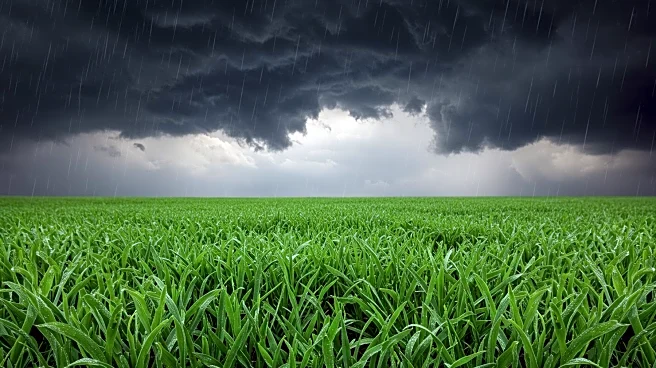What's Happening?
China is grappling with significant challenges to its agricultural sector due to climate change, which is threatening its long-standing policy of food self-sufficiency. The country, which feeds nearly 20% of the global population with less than 9% of the world's arable land, is experiencing rising temperatures, erratic rainfall, and more frequent droughts and floods. These climate conditions are affecting the production of staple crops such as wheat, rice, and maize. In response, China is integrating climate adaptation strategies into its agricultural reforms, as outlined in its 14th Five-Year Plan. This includes investments in water-saving irrigation, climate-resilient seeds, and precision farming technologies. Additionally, China is expanding its trade relations through the Belt and Road Initiative to secure a more diverse supply of grains.
Why It's Important?
The impact of climate change on China's agriculture has significant implications for global food security and trade. As China seeks to maintain its food supply, it is reducing its reliance on Western agricultural imports, which could alter global trade dynamics. This shift is part of a broader strategy to limit dependence on Western suppliers, similar to its approach in other sectors like semiconductors and energy. The changes in China's import patterns, particularly in wheat, could affect major exporters like Canada, Australia, and the United States. Furthermore, China's efforts to enhance its agricultural productivity through technology and international partnerships could serve as a model for other nations facing similar climate challenges.
What's Next?
China's ongoing efforts to adapt its agriculture to climate change will likely continue to evolve, with potential impacts on global food markets. The country's focus on technological innovation in agriculture, such as hybrid rice development and digital farming tools, may lead to increased efficiency and resilience. Additionally, China's strategic partnerships with emerging economies for grain supplies could strengthen its food security while reshaping international trade relationships. Observers will be watching how these developments influence global agricultural policies and trade agreements.
Beyond the Headlines
China's historical experiences with food insecurity, particularly the famine from 1958 to 1962, continue to influence its current policies. The government's commitment to self-reliance is now being reinforced by the need to address climate change. This historical context underscores the importance of sustainable agricultural practices and international cooperation in ensuring food security in the face of environmental challenges.











